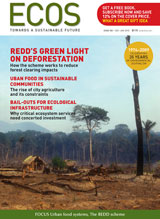
|
Published:
Indian Ocean imprint found in Australia’s firey south-east
Climate researchers have established further links connecting rising temperature to the decade-long drought in Australia’s south-east, as well as a feature of the Indian Ocean that precedes major bushfires across the region.
CSIRO Wealth from Oceans Flagship’s Wenju Cai and Tim Cowan, and Mike Raupach from CSIRO Marine and Atmospheric Research, examined the connection between climate change and bushfires and positive Indian Ocean dipole (pIOD) events.
Such events are a phase in which the eastern Indian Ocean is cooler than usual while the western Indian Ocean is warmer than usual. These conditions tend to lead to lower than average rainfall and higher temperatures over south-eastern Australia.
The researchers found that pIODs reduce the soil moisture, increasing the fuel load leading into summer. They also showed that of 16 pIOD events since 1950, 11 were followed by major bushfires. Of the past 21 major bushfires, 11 were preceded by a pIOD. The authors also found that bushfires in Australia’s south-east are more strongly associated with pIOD events than with El Niño events.
Because global warming is likely to increase the frequency of pIOD events, the authors suggest that the bushfire risk will also increase.
In a recent research paper,1 scientists say the Black Saturday bushfires in Victoria in early February and the Ash Wednesday bushfires in February 1983 were both preceded by a positive phase of the Indian Ocean dipole.
The scientists went on to establish a systematic link between major bushfires and pIODs. They found that the impact is carried over to the fire season through the memory of soil moisture.
During Victoria’s rain seasons, particularly spring, a pIOD event contributes to lower rainfall and higher temperatures, exacerbating the dry conditions and increasing the fuel load leading into summer.
1 Cai W, Cowan T and Raupach M (2009) Positive Indian Ocean dipole events precondition southeast Australia bushfires. Geophysical Research Letters 36, L19710, doi:10.1029/2009GL039902.



